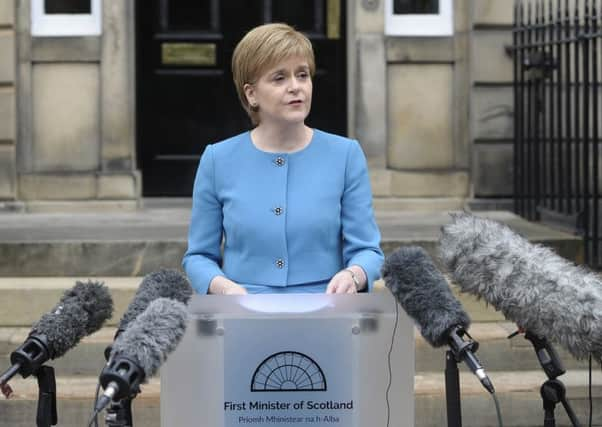Leaders: Problems at home must be priority over EU dream


In setting out her demands over Scotland’s relationship with the European Union, no-one can accuse Nicola Sturgeon of lack of ambition.
In a speech today she is expected to lay out five key requirements covering “democracy, economic prosperity, social protection, solidarity and influence”.
Advertisement
Hide AdAdvertisement
Hide AdBut laudable though these aims may be, how realistic are they without full EU membership? Reading through the detail, they seem impossible to reconcile with the recent UK-wide majority vote to leave the EU. Her wish-list includes the safeguarding of free movement of labour, access to the single market and university funding and maintaining influence in EU decision-making and councils.
There is little here that could fairly be said to leave “wriggle room”. Her demands are, in effect, for the full maintenance of the current terms and conditions of full EU membership.
Since the outcome of the vote became known on 24 June, Ms Sturgeon and senior SNP spokespeople have lost no opportunity to insist that Scotland be treated differently to the rest of the UK.
She has made earnest representations to top European Commission figures but has received little comfort, being told that the UK is regarded as a single entity and that this is unlikely to change barring a second vote on Scottish independence – this time with a Yes result. Angus Robertson, the party’s leader at Westminster, has repeatedly made reference to a second independence referendum – and one that needs to be held sooner rather than later.
The strategy appears to be one of “aim high” in the hope that the UK government, anxious to avoid a break-up, might make concessions to at least recognise that a majority of Scots voted to remain with the EU. However, there is already evident pressure from the government back benches to ensure that there is no backsliding and that, to quote the Prime Minister, “Brexit Means Brexit”.
Here again, scope for wriggle room looks dauntingly small. However, while European Commission president Jean Claude Juncker insists that there can be no single market access without agreement on free movement, this may need to be revisited in the light of terrorist atrocities and pressure from France and other countries for tighter border controls.
Meanwhile, the preoccupation of the Holyrood administration with the referendum outcome is not without opportunity cost. A month before the vote the administration declared that, in the face of economic slowdown, growth and enterprise were to be the priorities.
Official figures released last week showed that the economy in Scotland failed to show any growth in the first quarter. Our economy is now significantly under-performing that of the UK as a whole. Few doubt the importance of securing a Scottish voice in forthcoming negotiations with the EU. But it would be reassuring if the attention of the First Minister and her colleagues could also come to bear on the big problems bubbling up at home.
Greedy Green should now pay up
Advertisement
Hide AdAdvertisement
Hide AdOne man and one man alone is responsible for the demise of BHS and the plight of thousands of employees and pensioners: Sir Philip Green.
So concludes a scathing joint report today by two Commons committees into the collapse of BHS. It brands him as the “unacceptable face of capitalism” and finds that he systematically extracted huge sums from the store giant while leaving its pension fund in deficit.
It says he has a “moral duty” to make a “large financial contribution” to the 20,000 pensioners facing substantial cuts. Although his family accrued “incredible wealth” from their early, profitable years of owning BHS – while paying little in tax – Green failed to invest and refused to address the “substantial and unsustainable” pension fund deficit.
While the committees were damning about Dominic Chappell, who bought BHS for £1, and the “directors, advisers and hangers-on” associated with the deal, they said that ultimate responsibility lay with Green.
The Work and Pensions, and Business and Innovation and Skills committees said it was “inconceivable” he had not realised that Chappell, a former bankrupt with no retail experience, was a “manifestly unsuitable” buyer.
With conclusions like that there is no hiding place for Green. It would be galling if were not stripped of his knighthood. Nor should he be allowed to walk away without a substantial reparation payment to the group’s pensioners.
Green’s “stewardship” failed on basic competence. But it is his greed for which he will be remembered. That he was able to defy all systems of accountability and corporate responsibility leaves huge issues for the regulators, the government and the business community to address.